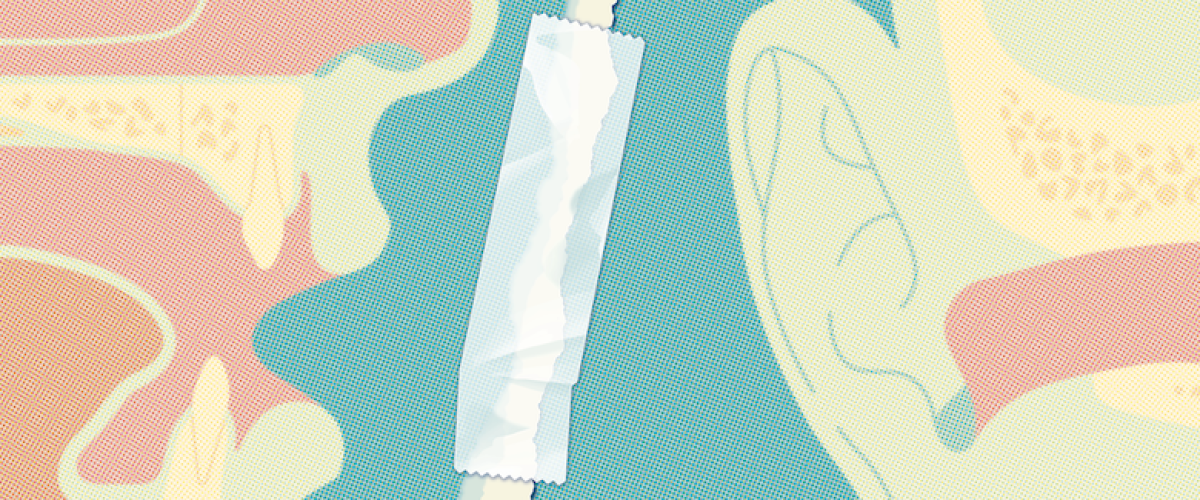
Chair's Message
Jump to Section
Feature Story
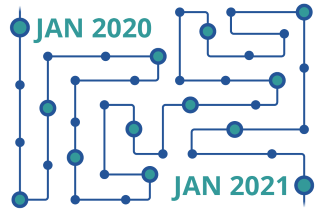
One Year of a Pandemic:
Fostering a New Department While Fighting COVID-19
As members of a new department, faculty and staff in the Department of Head and Neck Surgery & Communication Sciences eagerly anticipated rapid progress and development throughout 2020 in becoming a model department. When the coronavirus pandemic hit in early 2020, plans needed to be changed.
Research
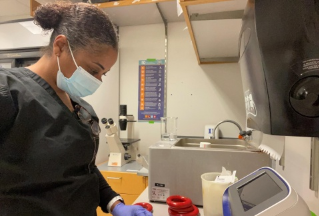
From Division to Department:Research Growth in Head and Neck Surgery & Communication Sciences
A key aspect of the strategic plan for the new department has involved clinician–scientist recruitment to continue the department’s mission of “advancing and sharing knowledge in the field.” As a result, the department has seen tremendous growth in research productivity and external research funding.

Sniffing Out An Abrupt COVID-19 Symptom
Before the pandemic, Brad Goldstein, MD, PhD, Associate Professor at Duke in the Departments of Head and Neck Surgery & Communication Sciences and Neurobiology, treated patients regularly who suffer from an altered sense of smell or taste for one reason or another, whether it be sinusitis, traumatic head injury, or post-viral congestion. But lately, Goldstein has seen a new population of patients. These patients have tested positive for COVID-19 and are experiencing one of the cardinal symptoms of the disease: loss of smell and taste.
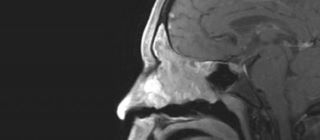
Strategies for Sinonasal Squamous Cell Carcinoma
Due to the rarity and surgical complexity of sinonasal poorly differentiated squamous cell carcinoma (PDSCC), treatment regimens are often extrapolated from those of more common cancers of the oral cavity and other areas of the head and neck. However, with such limited data, optimal treatment protocols remain controversial, particularly with regard to the role of chemotherapy and the definitive sequence of therapy for this cancer.

Are Two Always Better Than One?
Hearing loss often isolates patients, disconnecting them from conversations with family, friends, and coworkers, especially when there is background noise in a group setting or a restaurant. Normal leisure activities during the COVID-19 pandemic, such as enjoying television or communicating with loved ones via phone or video call, are especially challenging for those suffering from hearing loss and for their loved ones. A new study will test the efficacy of using two hearing aids versus one.
Patient Care
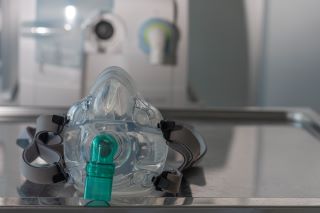
Duke Speech Pathologist Gives Insight Into Recovery for Those Put on a Ventilator Due to COVID-19
A speech pathologist on the front line of the coronavirus pandemic at Duke University Health is giving insight into what it’s like for people recovering from the virus after being put on a ventilator.

How to Care for Your Voice in Online Meetings
Sherilynn Black was well-prepared for Duke’s Living While Black symposium last summer when Black members of the Duke community shared personal stories of racism and discrimination and presented research on racial inequities. In the week leading up to the event, she spent nearly 12 hours a day on Zoom, organizing themes for sessions, troubleshooting technical issues and preparing messages. As the event drew near, she developed a scratchy throat but didn’t think much of it until she woke up the morning before the event with no voice.
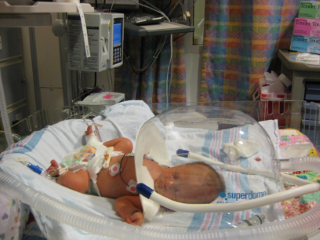
Congenital CMV: What You Need to Know
Anticipation. It is the most felt emotion on the way to labor and delivery. This little bundle of joy has been talked about, prayed over, sung, and read to as soon as the family knew it was on the way. Finally, the big day and all is well – until “What, wait, say that again?” “Did we hear this correctly?” The words send so many questions and thoughts spiraling through their heads: “Your baby failed their newborn hearing screen.” How did this happen? Will my baby ever hear? Will they learn to talk and communicate? The most likely culprit is cytomegalovirus (CMV).
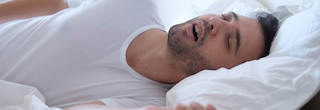
CPAP Alternative Improves Outcomes for Obstructive Sleep Apnea
As a Duke otolaryngologist, Russel R. Kahmke, MD, MMCi, FACS, says that 50% of his practice has become dedicated to evaluating and treating snoring and obstructive sleep apnea, but there is still a significant population of patients across the country with this condition who are not being treated or do not like their current treatment.
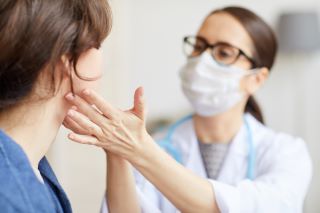
Sialendoscopy Removes Salivary Stones, Spares Glands, Speeds Recovery
When Darlene Carroll complained about pain and swelling in her neck while eating, her doctor told her “it had something to do with my saliva.” A salivary stone—a hardened build-up of minerals, similar to a kidney stone—was blocking the flow of saliva from a gland under Carroll’s chin.
Education

Training in a Pandemic
Challenges are opportunities in disguise. No statement more accurately reflects the training environment this time a year ago. As we learned more about the novel coronavirus and its method of transmission, it became clear this would uniquely affect our specialty. With viral loads highest in the head and neck region and a need to examine these areas as a practicing otolaryngologist, we needed to establish protocols that would place safety at the forefront of the resident experience.
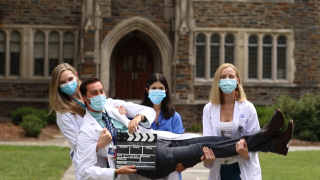
Residency Recruitment in the Age of COVID-19
Nationwide, residency programs faced the same dilemma in 2020: how can a program truly engage applicants and offer candidates an authentic representation of the resident experience when recruiting must take place entirely through a computer screen?
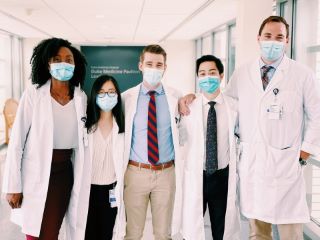
HNS&CS Maintains Strong Connections With Alumni
"Your past, your current, and your future support are very much meaningful to the current trainees. Even in the midst of starting intern year in a pandemic, I've seen the ways in which your support has been contributing so positively to my education." View a video message to alumni from current residents, and hear from a former alum who supports the mission of HNS&CS.
Community Engagement
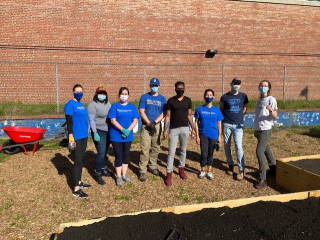
Head and Neck Surgery & Communication Sciences Community Engagement Program
In fall 2020, the Duke Department Head and Neck Surgery & Communication Sciences (HNS&CS) began a partnership with Activate Good to provide volunteers to help causes in our local community. To date, HNS&CS faculty, staff, friends, and family have volunteered for six events in Raleigh and Durham, including food banks, community gardens, and school projects. We are renewing our partnership for 2021.
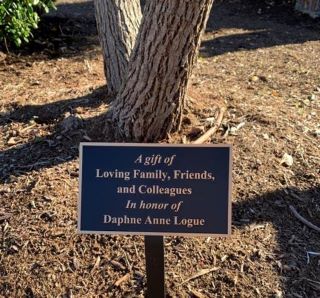
The Daphne Logue Memorial Tree
At the end of 2020, a sassafras tree was planted in the Garden of Tranquility at Duke Cancer Center in memory of nurse Daphne Logue. This beautiful memorial was achieved as a labor of love by Daphne's twin sister Stephanie Knox. In a video message, Stephanie shares some of her memories of Daphne, along with Daphne's close friend HNS&CS nurse Kitty Lockner, RN.
Giving
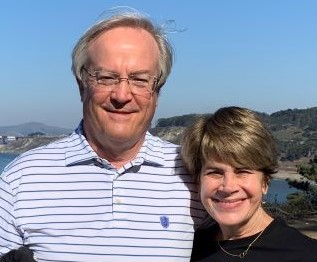
The Inspiration to Give
Many of us can identify one influential leader in our lives who has inspired and motivated us, whose vision and mission have propelled us forward to make a difference. For Debara L. Tucci, MD, MBA, MS, that person is Howard W. Francis, MD, MBA, chair, department of Head and Neck Surgery and Communication Sciences.
Faculty Recognition
About the banner: The COVID-19 pandemic continues to cause feelings of isolation and disconnection in the general population. The department's vision of promoting healthier connections with the world is paramount in an era when communication is crucial, yet immensely challenging. Illustration by Megan Llewellyn, CMI.
Give to Duke Head and Neck Surgery & Communication Sciences
A gift to the Department of HNS&CS is a gift of knowledge, discovery, and life.